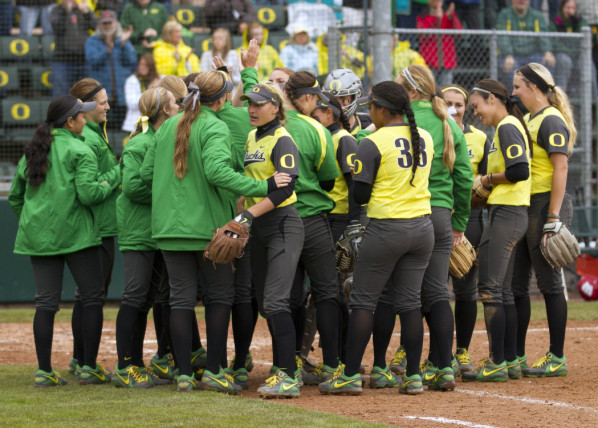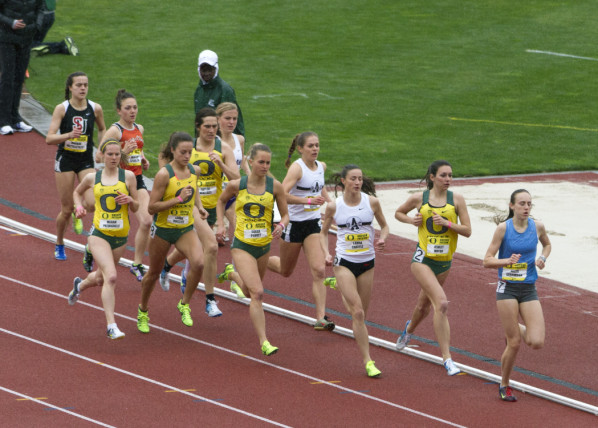Continued Excellence
1990s: Proceeding as Planned
The women’s teams accumulated numerous accomplishments during the 1990s, garnering recognition as one of the nation’s top athletic programs. Building upon the success of the previous decade, track and field stars continued to represent the women’s program well. The cross-country team finished in the top 10 at the National Championships five times and in the top 20 nine times during the 1990s. The women’s basketball team found similar success, qualifying for the NCAA Championship Tournament six out of 10 years. The basketball team was also won the Pac-10 Championship two seasons in a row (1998-1999; 1999-2000). In addition, the softball team qualified for postseason play in four seasons during this span (1990, 1994, 1998, and 1999).
In addition to team successes, individual athletes also made their marks. Oregon saw two-sport standout Kelly Blair (basketball and track and field) reach the top of the national charts in the heptathlon. Blair also competed in the 1996 Olympic Games in Atlanta. Other notables included Kodak All-American Natalie Hughes (basketball 1998) and two-time All-American Julie Cavanaugh (softball 1990, 1991). Also during this period, Annette Hand won three USA Track & Field National Championships (1993: 1,500-meters and 3,000-meters; 1994: 3,000-meters) and competed in the 3,000-meters at the 1992 Barcelona Olympics.
Combined with the countless accomplishments was the growth of the women’s program as a whole. By 1996, the University added women’s soccer back into the lineup, bringing the total number of intercollegiate sports for women at Oregon to eight.
With the start of the next decade, women’s athletics continued building upon its highly regarded tradition of excellence.
 2000s: The New Millenium
2000s: The New Millenium
Bridging the gap between tradition and evolution, the early 2000s kicked off with the return of Oregon’s legendary basketball star Bev Smith, this time as the women’s head coach. Smith helped guide the team to the 2002 WNIT Championship and to the second round of the 2005 NCAA Tournament. Flowing with talent, the teams had numerous individual stars including five WNBA draftees: Catherine Kraayeveld (2005), Shaquala Williams (2003), Edniesha Curry (2002), Jenny Mowe (2001), and Angelina Wolvert (2001).
Oregon women found similar success in other sports as well. Sarah Malone became a three-time All-America winner in the javelin, in addition to competing in the 2004 Athens Olympics and capturing the Oregon school-record. Track and field star Becky Holiday also made her mark, earning the NCAA Pole Vault Championship in 2003.
 Reshaping the Foundation
Reshaping the Foundation
Significant changes in the structure of women’s athletics at Oregon occurred during this era. Tom Heinonen retired in 2003, marking the end of the notable Oregon women’s track and field coach’s 28-year career at the University. Heinonen’s departure also spurred a transition in coaching roles. Men’s cross-country and track and field head coach Martin Smith took over the women’s programs as well, ending Oregon’s tradition of having separate men’s and women’s head coaches.
Shortly thereafter, lacrosse was added as the ninth women’s sport in 2004. Not a traditionally strong sport in the Northwest, the addition of lacrosse not only signaled growth of women’s athletics at Oregon internally, but on a national platform as well. Competing against teams primarily on the East Coast posed challenges for travel and scheduling but offered an opportunity for the University to expand its scope.
As the second half of the decade begins, Oregon women’s athletics continues to undergo change, building upon the rich tradition of the past in pursuit of a leading presence in the national arena for the future.